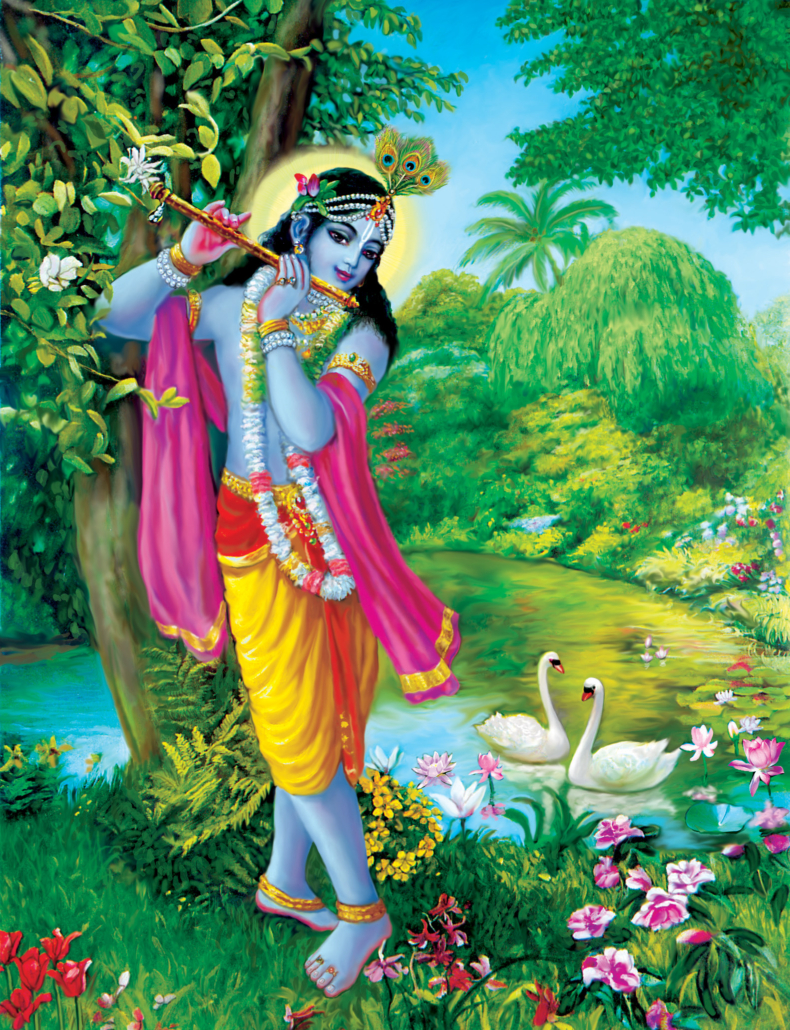Mahanidhi Madan Gopal Das
The Srimad Bhagavatam appeared the day after Radhastami. Sri Sukadev Goswami began speaking the Bhagavata to Raja Parikshit on Bhadra Shukla Naumi.
Sri Sukadevji spoke the Srimad Bhagavatam to show the world the quintessence of love divine, Krishna prema, perfectly personified in Srimati Radharani, Bhagavan Sri Krishna’s dearest devotee.
According to Padma Purana (Bhagavat Mahatmya 6.94), Srimad Bhagavatam was spoken thirty years after Sri Krishna’s departure. The Srimad-Bhagavatam states that Sri Krishna Himself reappeared in a shastra-rupa, literary form, to enlighten the unfortunate souls of Kali-yuga:
krsne sva-dhamopagate dharma-jnanadibhih saha
kalau nasta-drsam esa puranarko’dhunoditah
“After Bhagavan Sri Krishna departed for the spiritual realm along with religious principles and divine wisdom, the Srimad Bhagavatam has arisen like the sun in this Age of Kali to enlighten those who have no spiritual vision.” (Srimad Bhagavatam 1.3.43)
Sri Jiva Goswamipada said, “Srimad Bhagavatam describes [samadhi-bhashya] the truth that Vyasadeva saw in samadhi i.e. the purusham purnam, the complete Personality of Godhead Sri Krishna.” (Tattva Sandarbha 19)
Srimad-Bhagavatam has been glorified in many shastras. For example, in the Skanda Purana, Visnu-khanda, there are four chapters dedicated to the Srimad-Bhagavatam. In the Padma Purana, Uthara-khanda, in the Garuda Purana, and in a few other Puranas, we find ample glorification of the Srimad-Bhagavatam.
Srimad-Bhagavatam describes ten subjects: sarga (primary creation), visarga (secondary creation), sthana (maintenance), poshana (mercy), uti (desires), manvantara (reigns of Manus), ishanukatha (pastimes of Bhagavan Sri Krishna and His devotees), nirodha (annihilation), mukti (liberation), and ashraya (the ultimate shelter, Radha-Krishna prema). (Srimad Bhagavatam 2.10.1)
The reason why the Srimad-Bhagavatam describes these topics is to help us realize that Bhagavan Sri Krishna is the Supreme Personality of Godhead.
According to Jiva Gosvami, Srimad Bhagavatam describes three basic subjects:
(1) our identity in relation to the Absolute Truth (sambandha-jnana).
(2) the process to realize that identity (abhidheya-tattva), and
(3) the ultimate goal achieved by doing so (prayojana-tattva).
Srimad Bhagavatam describes uttama-bhakti and everything related to the service and attainment of Bhagavan Sri Krishna, the Supreme Personality of Godhead.
Sri Rupa Goswamipada defines uttama-bhakti:
anyabhilashita shunyam
gyana-karmady-anavrtam
anukulyena krishnanu
shilanam bhaktir uttama
“Uttama-bhakti means serving Sri Krishna with one’s body, mind, senses, words, intelligence, and feelings in a favorable mood. It is free from any other desire, and it is not covered by knowledge of impersonal brahman, by the daily and periodic duties outlined in the smrti-shastras or by renunciation, yoga, sankhya, and other types of dharma.” (Bhakti-rasamrta-sindhu 1.1.11)
Mahaprabhu said, “In the beginning, middle, and end, the Srimad Bhagavatam speaks only of Krishna bhakti. Thus, Srimad Bhagavatam is eternally perfect, infallible, and infinite, because it contains all truths pertaining to the infinite Sri Krishna. (Caitanya Bhagavata 3.3.506)
Sri Caitanya Mahaprabhu said Srimad Bhagavatam means love, Krishna prema:
premamaya bhagavata, krsnera sri anga
tahate kahena yata, gopya krsneranga
“Srimad Bhagavatam is full of Krishna prema. It is non-different from the beautiful body of Krishna and is a part of Krishna Himself, for it describes Krishna’s confidential pastimes.” (Caitanya Bhagavata 3.3.516)
What follows is a beautiful quote explaining how the Bhagavatam inspires a sweet flow of love between Bhagavan and His bhakta:
“Srimad Bhagavatam describes a dynamic account of a constantly expanding divine love experienced by the bhakta and Bhagavan Sri Krishna, and the reciprocation of that love. This love swelling in the heart of the bhakta is reflected in the heart of Sri Krishna, and because of the happiness that Sri Krishna feels from his bhakta’s love, it starts to be reflected in the heart of the devotee and become even greater. It is an autocatalytic reaction that takes place between them, the reaction of love, Krishna prema. (Sri Bhakti Vigyan Goswami)
Daily hearing, chanting and reading of the Srimad Bhagavatam allows one to constantly associate with Bhagavan Sri Krishna.
The Srimad Bhagavatam itself proclaims its extraordinary power:
tac chrnvan su-pathan vicarana
paro bhaktya vimucyen narah
“Anyone who seriously tries to understand Srimad Bhagavatam by hearing and chanting it with devotion will become completely liberated.” (Srimad Bhagavatam 12.13.18)
Visvanatha Cakravartipada tika: This verse establishes Bhagavatam’s supreme position. This Purana alone is especially glorious because it is completely transcendental and free any touch of the three gunas (sattva, rajas, tamas).
Srimad Bhagavatam describes the sweetest nectar of love for Bhagavan Sri Krishna in the following verse:
sarva-vedanta-saram hi
sri-bhagavatam isyate
tad-rasamrta- trptasya
nanyatra syad ratih kvacitit
“Srimad Bhagavatam is the essence of all Vedanta philosophy. One who feels satisfaction from its nectar love rasas will never be attracted to any other literature.” (Srimad Bhagavatam 12.13.15)
Sri Jiva Goswamipada tika: Bhagavatam is the form of pure rasa, the ripened fruit on the desire tree. (KS 1.1.3)
“The Srimad Bhagavatam’s words are most powerful and tasty!” (Pandit Sri Ananta Dasji Maharaja)
Grantha raja Srimad Bhagavatam Maha Purana ki jai! Jai Jai Sri Radhe!

